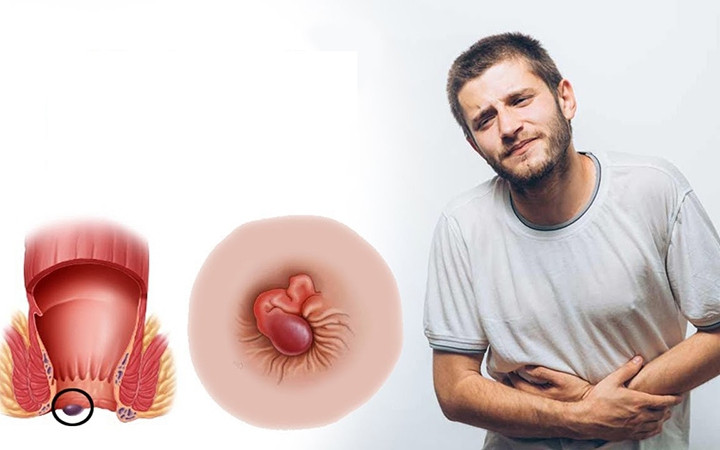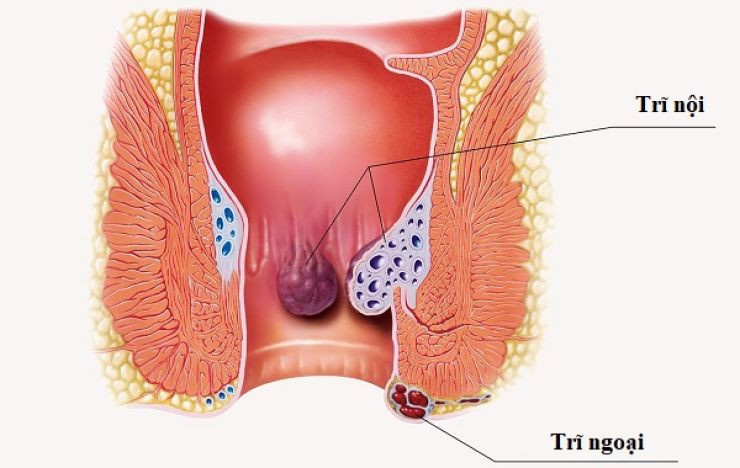Can hemorrhoids heal on their own? What should you do when you have hemorrhoids?
Hemorrhoids are one of the benign diseases of the anal region. More than half of the population suffers from hemorrhoids, usually starting after the age of 30. Most patients with hemorrhoids suffer for a long time before seeking the help of a specialist.

Hemorrhoids are a common condition, affecting more than half of the population, usually starting after the age of 30. Most patients with hemorrhoids suffer for a long time before seeking the help of a specialist. Today, there are many effective and less painful methods of treating hemorrhoids.
Hemorrhoids, if present in the early stages, can be cured by changing lifestyle without surgery. However, if not treated properly, it can cause dangerous complications such as anal tract infection, abscess...
If you have hemorrhoids and have black stools or blood in your stools, go to the hospital for a check-up. It could be a sign of another serious digestive disease.
Due to unscientific diet and lifestyle, the number of people suffering from hemorrhoids is increasing. Previously, hemorrhoids were common in people over 30 years old, but in recent years this disease has become increasingly younger, even students still in school have this disease.
Risk factors and causes of hemorrhoids include:
- Constipation or diarrhea will increase the frequency of hemorrhoids, straining increases pressure on the veins, causing distension and blood stasis.
- Low fiber diet.
- Overweight and obesity.
- People who regularly do heavy labor such as porters, weightlifters, tennis players... people who often stand or sit for long periods of time such as secretaries, tailors, sales staff... will increase abdominal pressure, hinder blood return to the heart, leading to hemorrhoidal varicose veins.
- Pelvic tumors include colorectal tumors, uterine tumors, or tumors in many months of pregnancy that will obstruct blood return to the heart, causing varicose veins.

How to treat hemorrhoids?
When suffering from hemorrhoids, people are often afraid and rarely go to the doctor, but early examination is extremely important. If the hemorrhoids are mild, doctors will examine, advise, guide diet, lifestyle, and prescribe medication. For severe hemorrhoids, surgery is needed to remove the hemorrhoids.
At home, hemorrhoid patients can use the following measures to overcome and significantly reduce hemorrhoid symptoms such as:
- Need to supplement more fiber and water. Fluids along with fiber can help soften stools, making bowel movements easier. Fiber can be supplemented through fiber-rich foods such as: green vegetables, beans, wheat, oats, whole grains, nuts and fresh fruits...
- Avoid spicy foods (pepper, chili...)
- Exercise is needed. 20-30 minutes of exercise each day can stimulate bowel function, making bowel movements easier. Avoid standing or sitting for long periods of time.
- Practice regular bowel habits. If you feel the urge to go, go immediately. When you hold it in, the stool can reflux and cause pressure. You can clean your anus daily and soak it in warm water for 10-15 minutes after a bowel movement, which may help relieve symptoms.
Complications that can occur when having hemorrhoids:
Although rare, hemorrhoids can cause complications such as:
- Anemia:If hemorrhoids bleed too much, it can cause anemia. Some problems related to anemia include: fatigue, shortness of breath, headaches, and dizziness.
- Infection:Bacteria can enter the hemorrhoid causing bleeding and infection. Untreated infection can lead to abscesses and fever.
- Severe pain:When a hemorrhoid prolapses or a blood clot forms within the hemorrhoid, it can cause excruciating pain.
To effectively prevent hemorrhoids, patients should regularly add more fiber to their meals, drink enough water, exercise properly, etc. If the body shows unusual symptoms, they should go to a medical facility for examination and treatment. Do not be afraid and do not take medicine as advised, because it will lead to many health consequences./.
